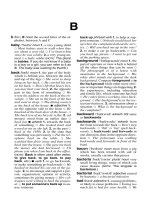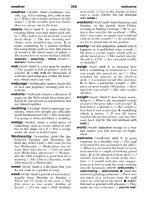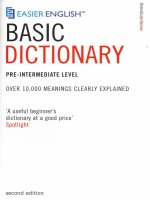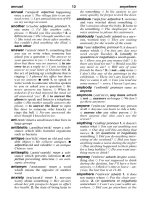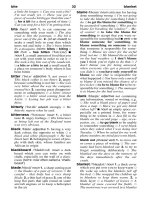Easier English Basic Dictionary P1
Bạn đang xem bản rút gọn của tài liệu. Xem và tải ngay bản đầy đủ của tài liệu tại đây (919.68 KB, 30 trang )
EASIER
ENGLISH
BASIC
DICTIONARY
SECOND EDITION
Dictionary Titles in the Series
English Language:
Easier English Basic Synonyms 0 7475 6979 7
English Study Dictionary 1 9016 5963 1
Easier English Student Dictionary 0 7475 6624 0
English Thesaurus for Students 1 9016 5931 3
Specialist Dictionaries:
Dictionary of Accounting 0 7475 6991 6
Dictionary of Banking and Finance 0 7475 6685 2
Dictionary of Business 0 7475 9680 0
Dictionary of Economics 0 7475 6632 1
Dictionary of Environment and Ecology 0 7475 7201 1
Dictionary of Hotels, Tourism and Catering Management 1 9016 5999 2
Dictionary of Human Resources and Personnel Management 0 7475 6623 2
Dictionary of ICT 0 7475 6990 8
Dictionary of Marketing 0 7475 6621 6
Dictionary of Medical Terms 0 7475 6987 8
Dictionary of Military Terms 1 9038 5620 5
Dictionary of Nursing 0 7475 6634 8
Dictionary of Science and Technology 0 7475 6620 8
Check your English Vocabulary Workbooks:
Business 0 7475 6626 7
Computing 1 9016 5928 3
English for Academic Purposes 0 7475 6691 7
PET 0 7475 6627 5
FCE + 0 7475 6981 9
IELTS 0 7475 6982 7
TOEFL
®
0 7475 6984 3
Visit our website for full details of all our books
/>EASIER
ENGLISH
BASIC
DICTIONARY
SECOND EDITION
General editor
P.H. Collin
A BLOOMSBURY REFERENCE BOOK
www.bloomsbury.com
Second edition published 2004
First published in Great Britain 2001
© Copyright P.H. Collin, F. Collin, S.M.H. Collin 2001
This edition © Copyright Bloomsbury Publishing 2004
Bloomsbury Publishing Plc
38 Soho Square
London W1D 3HB
All rights reserved. No part of this publication may
be reproduced in any form or by any means without the
permission of the publishers.
British Library Cataloguing-in-Publication Data
A catalogue record for this book is available from the British Library
ISBN 0 7475 6644 5
Text processing and computer typesetting by Bloomsbury Publishing
Printed and bound in Italy by Legoprint
All papers used by Bloomsbury Publishing are natural, recyclable
products made from wood grown in well-managed forests.
The manufacturing processes conform to the
environmental regulations of the country of origin.
eISBN-13: 978-1-4081-0202-2
GENERAL EDITOR
P. H. Collin
Editorial Contributors
Penelope Hands, Howard Sargeant
Text Production and Proofreading
Katy McAdam, Joel Adams,
Daisy Jackson, Sarah Lusznat
Preface
This dictionary contains the most frequently used words in English and provides the
basic vocabulary needed for everyday communication by anyone starting to learn the
language. It is especially useful for elementary and pre-intermediate students of all
ages and would be suitable for those working towards an elementary level English
examination such as KET or PET.
Each word is individually defined, and no words, not even adverbs, are given with
-
out a definition. Examples are included for many words to provide patterns for the
user’s own production of English sentences.
Each word, including compound words and phrasal verbs, has its own easy-to-find
main entry in bold type. Each word has a pronunciation in the International
Phonetic Alphabet. Common phrases and idioms associated with the main term are
shown in bold type and separately defined within the entry.
The meanings of the main common senses of each word are given clearly and sim
-
ply, using a limited and easily understood vocabulary. Meanings are grouped
together by their part of speech.
Extra help is offered in Notes at the end of some entries. These include warnings
about words which can confused with each other, unusual inflected forms and
regularly collocating prepositions. The major differences in US and British
spelling are noted.
A useful companion to this dictionary is Easier English Basic Synonyms which
compares and contrasts words with similar meanings, showing the similarities and
differences in usage.
Symbols
í
before a new part of speech
ć
before examples
˽ before a phrase or collocation
ȣ
before an idiom
ı
a definition of the word will be found at the place indicated
extra information will be found at the place indicated
Pronunciation
The following symbols have been used to show the pronunciation of the main
words in the dictionary.
Stress has been indicated by a main stress mark ( ) and a secondary stress
mark ( ). Note that these are only guides, as the stress of the word changes
according to its position in the sentence.
Vowels Consonants
back b buck
ɑ harm d dead
ɒ stop ðother
a type d jump
aυ how f fare
aə hire gold
aυə hour h head
ɔ course j yellow
ɔ annoy k cab
ehead l leave
eə fair m mix
e make n nil
eυ go ŋ sing
word p print
i keep r rest
i happy s save
ə about ʃ shop
fit t take
ə near tʃ change
u annual θ theft
u pool v value
υ book w work
υə tour x loch
shut measure
z zone
A
a
a
1
/
e
/, A
noun
the first letter of the alpha-
bet, followed by B
ć
Do you mean ‘de-
pendant’ spelt with an ‘a’ or ‘depend-
ent’ with an ‘e’?
ȣ
from A to Z
com-
pletely, all the way through
a
a
2
/
ə, e
/, an /
ən, n
/
article
1.
one
ć
an
enormous hole
ć
a useful guidebook
ć
She’s bought a new car.
ć
I want a cup
of tea.
ć
We had to wait an hour for the
bus.
(
NOTE
: an is used before words
beginning with a, e, i, o, u and with h if
the h is not pronounced:
an apple
or
an hour
. a is used before words begin-
ning with all other letters and also be-
fore u where u is pronounced /
ju
/ :
a
useful guidebook
) 2.
for each or to each
ć
Apples cost £1.50 a kilo.
ć
The car
was travelling at 50 kilometres an hour.
ć
He earns £100 a day.
abandon
abandon
/
ə
bndən
/
verb
1.
to leave
someone or something in an unkind way
ć
The dog had been abandoned by its
owner.
2.
to give up or stop doing some-
thing
ć
The company has decided to
abandon the project.
ć
We abandoned
the idea of setting up a London office.
abbreviation
abbreviation
/
ə
brivi
eʃ(ə)n
/
noun
a
short form of a word
ability
ability
/
ə
blti
/
noun
1.
a natural tenden-
cy to do something well
ć
I admire his
ability to stay calm in difficult situa-
tions.
ć
We can develop their natural
abilities.
(
NOTE
: The plural is abilities.)
˽
I’ll do it to the best of my ability I’ll
do it as well as I can
2.
the fact of being
clever
ć
suitable for different levels of
ability
(
NOTE
: no plural)
able
able
/
eb(ə)l
/
adjective
1.
˽
to be able to
do something to be capable of some-
thing or have the chance to do some-
thing
ć
They weren’t able to find the
house.
ć
Will you be able to come to the
meeting?
2.
good at doing something, or
good at doing many things
ć
She’s a
very able manager.
ć
There are special
activities for able children.
about
about
/
ə
baυt
/
preposition
1.
referring to
something
ć
He told me all about his
operation.
ć
What do you want to speak
to the doctor about?
2.
˽
to be about to
do something to be going to do some-
thing very soon
ć
We were about to go
home when you arrived.
3.
not exactly
ć
I’ve been waiting for about four hours.
ć
She’s only about fifteen years old.
ȣ
how about? 1.
what do you think
about?
ć
We can’t find a new chairper-
son for the club – What about Sarah?
2.
would you like a cup of tea?
ȣ
while
you’re about it
at the same time as the
thing you are doing
ć
While you’re
about it, can you post this letter?
above
above
/
ə
bv
/
preposition
1.
higher than
ć
The plane was flying above the
clouds.
ć
The temperature in the street
was above 30 degrees.
ć
At prices
above £20, nobody will buy it.
2.
older
than
ć
If you are above 18, you have to
pay the full fare.
3.
louder than
ć
I
couldn’t hear the telephone above the
noise of the drills.
abroad
abroad
/
ə
brɔd
/
adverb
in or to another
country
ć
They’ve gone abroad on holi-
day.
ć
I lived abroad for three years.
absence
absence
/
bsəns
/
noun
the fact of be-
ing away from a place
ć
She did not ex-
plain her absence from the meeting.
ć
The former president was sentenced in
his absence.
˽
in the absence of be-
cause someone or something is not there
ć
In the absence of the chairman, his
deputy took over.
ć
In the absence of
any official support, we had to raise our
own funds.
absent
absent
/
bsənt
/
adjective
not there
ć
Ten of the staff are absent with flu.
absolute
absolute
/
bsəlut
/
adjective
com-
plete or total
Basic.fm Page 1 Friday, January 16, 2004 3:10 PM
absolutely 2 accompany
absolutely
absolutely
adverb
1. /
bsəlutli
/
com-
pletely
ć
I am absolutely sure I left the
keys in my coat pocket.
2. /
bsə
lutli
/
yes, of course
ć
Did you build it your-
self? – Absolutely!
absorb
absorb
/
əb
zɔb
/
verb
1.
to take in
something such as a liquid
ć
The water
should be absorbed by the paper.
ć
Salt
absorbs moisture from the air.
2.
to re-
duce a shock
ć
The car’s springs are
supposed to absorb any shock from the
road surface.
absurd
absurd
/
əb
sd
/
adjective
completely
unreasonable or impossible to believe
ć
It’s absurd to expect you will win the lot-
tery if you only buy one ticket.
abuse
abuse
1
/
ə
bjus
/
noun
1.
rude words
ć
The people being arrested shouted
abuse at the police.
2.
very bad treat-
ment
ć
the sexual abuse of children
ć
She suffered physical abuse in prison.
(
NOTE
: [all senses] no plural)
abuse
abuse
2
/
ə
bjuz
/
verb
1.
to treat some-
one very badly, usually physically or
sexually
ć
She had been abused as a
child.
2.
to make the wrong use of some-
thing
ć
He abused his position as fi-
nance director.
3.
to say rude things
about someone
ć
The crowd noisily
abused the group of politicians as they
entered the building.
academic
academic
/
kə
demk
/
adjective
1.
re-
lating to study at a university
ć
Mem-
bers of the academic staff received a let-
ter from the principal.
2.
only in theory,
not in practice
ć
It is only of academic
interest.
í
noun
a university teacher
ć
All her friends are academics.
accelerate
accelerate
/
ək
seləret
/
verb
to go fast-
er
ć
Don’t accelerate when you get to
traffic lights.
accent
accent
/
ksənt
/
noun
1.
a particular
way of pronouncing something
ć
He
speaks with an American accent.
2.
the
stronger or louder part of a word or sen-
tence
ć
In the word ‘letter’ the accent is
on the first syllable.
3.
a mark over a let-
ter showing a particular way of pro-
nouncing it
ć
Café has an accent on the
‘e’.
accept
accept
/
ək
sept
/
verb
1.
to take and keep
a present
ć
We hope you will accept this
little gift.
2.
to say ‘yes’ or to agree to
something
ć
She accepted the offer of a
job in Australia.
ć
I invited her to come
with us and she accepted.
(
NOTE
: Do not
confuse with except.)
acceptable
acceptable
/
ək
septəb(ə)l
/
adjective
good enough to be accepted, although
not particularly good
ć
Fighting in the
street is not acceptable behaviour.
ć
Smoking is becoming less socially ac-
ceptable.
ć
A small gift of flowers would
be very acceptable.
ć
The offer is not
acceptable to the vendor.
access
access
/
kses
/
noun
a way of reaching
a place
ć
The concert hall has access
for wheelchairs.
ć
At present there is no
access to the site.
˽
to have access to
something to be able to reach a place,
meet a person, or obtain something
ć
I’ll have access to the studio day and
night.
ć
The company has access to
substantial funds.
í
verb
to get infor-
mation from a computer
ć
She tried to
access the address list.
accident
accident
/
ksd(ə)nt
/
noun
1.
an un-
pleasant thing which happens and caus-
es damage or injury
ć
He lost his leg in
an accident at work.
ć
She was involved
in a car accident and had to go to hos-
pital.
2.
something that happens unex-
pectedly
ć
Their third baby was an ac-
cident.
˽
by accident without being
planned or expected
ć
He found the
missing papers by accident.
accidental
accidental
/
ks
dent(ə)l
/
adjective
happening without being planned or ex-
pected
ć
an accidental meeting
ć
acci-
dental damage
ć
His death was not ac-
cidental.
accidentally
accidentally
/
ks
dent(ə)li
/
adverb
without being planned or expected
accommodation
accommodation
/
ə
kɒmə
deʃ(ə)n
/
noun
a place to live or somewhere to
stay for a short time
ć
Are you still look-
ing for accommodation?
ć
Visitors have
difficulty in finding hotel accommoda-
tion during the summer.
(
NOTE
: In Brit-
ish English, accommodation has no
plural.)
accompany
accompany
/
ə
kmp(ə)ni
/
verb
1.
to
go with someone or something
ć
She
accompanied me to the door.
2.
to play
a musical instrument while someone
Basic.fm Page 2 Friday, January 16, 2004 3:10 PM
accomplish 3 action
else plays another instrument or sings
ć
She sang and was accompanied on the
piano by her father.
(
NOTE
: accompa-
nied by someone
or
something)
accomplish
accomplish
/
ə
kmplʃ
/
verb
to do
something successfully
ć
You won’t ac-
complish anything by arguing.
according to
according to
/
ə
kɔdŋ tu
/
preposi-
tion
1.
as someone says or writes
ć
The
washing machine was installed accord-
ing to the manufacturer’s instructions.
ć
According to the police, the car was
going too fast.
2.
in agreement with
rules or a system
ć
Everything went ac-
cording to plan or schedule.
3.
in rela-
tion to
ć
The teachers have separated
the children into classes according to
their ages.
account
account
/
ə
kaυnt
/
noun
1.
same as
bank account 2.
˽
I was worried on
her account I was afraid something
might happen to her
ȣ
on account of
because of, due to
ć
The trains are late
on account of the fog.
ć
We don’t use the
car much on account of the price of pet-
rol.
ȣ
take something into account
to consider something
ć
We have to take
the weather into account.
ȣ
on no ac-
count
not at all
accurate
accurate
/
kjυrət
/
adjective
correct in
all details
ć
Are the figures accurate?
ć
We asked them to make an accurate
copy of the plan.
accurately
accurately
/
kjυrətli
/
adverb
correct-
ly
ć
The weather forecast accurately
predicted the storm.
accuse
accuse
/
ə
kjuz
/
verb
to say that some-
one has done something wrong
ć
The
police accused her of stealing the mon-
ey.
(
NOTE
: You accuse someone of a
crime or of doing something.)
achieve
achieve
/
ə
tʃiv
/
verb
to succeed in do-
ing something after trying very hard
ć
Have you achieved all your aims?
ć
The
company has achieved great success in
the USA.
achievement
achievement
/
ə
tʃivmənt
/
noun
something which has been done suc-
cessfully
ć
She is very modest about her
achievements.
ć
Coming sixth was a
great achievement, since he had never
entered the competition before.
acid
acid
/
sd
/
noun
a chemical substance
that is able to dissolve metals
acknowledge
acknowledge
/
ək
nɒld
/
verb
1.
to
say that something has been received
ć
She didn’t acknowledge receiving my
letter.
2.
to accept that something is true
ć
She acknowledged that she had seen
me there.
acknowledgement
acknowledgement
/
ək
nɒldmənt
/
noun
a letter or note sent to say that
something has been received
acorn
acorn
/
ekɔn
/
noun
the fruit of an oak
tree
acquaintance
acquaintance
/
ə
kwentəns
/
noun
a
person you know slightly
ć
She has
many acquaintances in the travel indus-
try but no real friends.
acquire
acquire
/
ə
kwaə
/
verb
to become the
owner of something
ć
She has acquired
a large collection of old books.
across
across
/
ə
krɒs
/
preposition
1.
from one
side to the other
ć
Don’t run across the
road without looking to see if there is
any traffic coming.
2.
on the other side
of
ć
He saw her across the street.
í
ad-
verb
from one side to the other
ć
The
river is only twenty feet across.
ć
The
stream is very narrow – you can easily
jump across.
act
act
/
kt
/
noun
1.
something which is
done
ć
He thanked her for the many
acts of kindness she had shown him over
the years.
2.
a part of a play or show
ć
Act 2 of the play takes place in the gar-
den.
3.
a short performance
ć
The show
includes acts by several young singers.
4.
a law passed by Parliament
ć
an act
to ban the sale of weapons
í
verb
1.
to
do something
ć
You will have to act
quickly if you want to stop the fire.
ć
She
acted in a very responsible way.
˽
to act
as someone or something to do the
work of someone or something
ć
The
thick curtain acts as a screen to cut out
noise from the street.
2.
to behave in a
particular way
ć
She’s been acting very
strangely.
ȣ
to get your act together
to organise yourself properly
ć
If they
don’t get their act together, they’ll miss
their train.
action
action
/
kʃən
/
noun
1.
the fact of doing
something
ć
We recommend swift ac-
Basic.fm Page 3 Friday, January 16, 2004 3:10 PM
